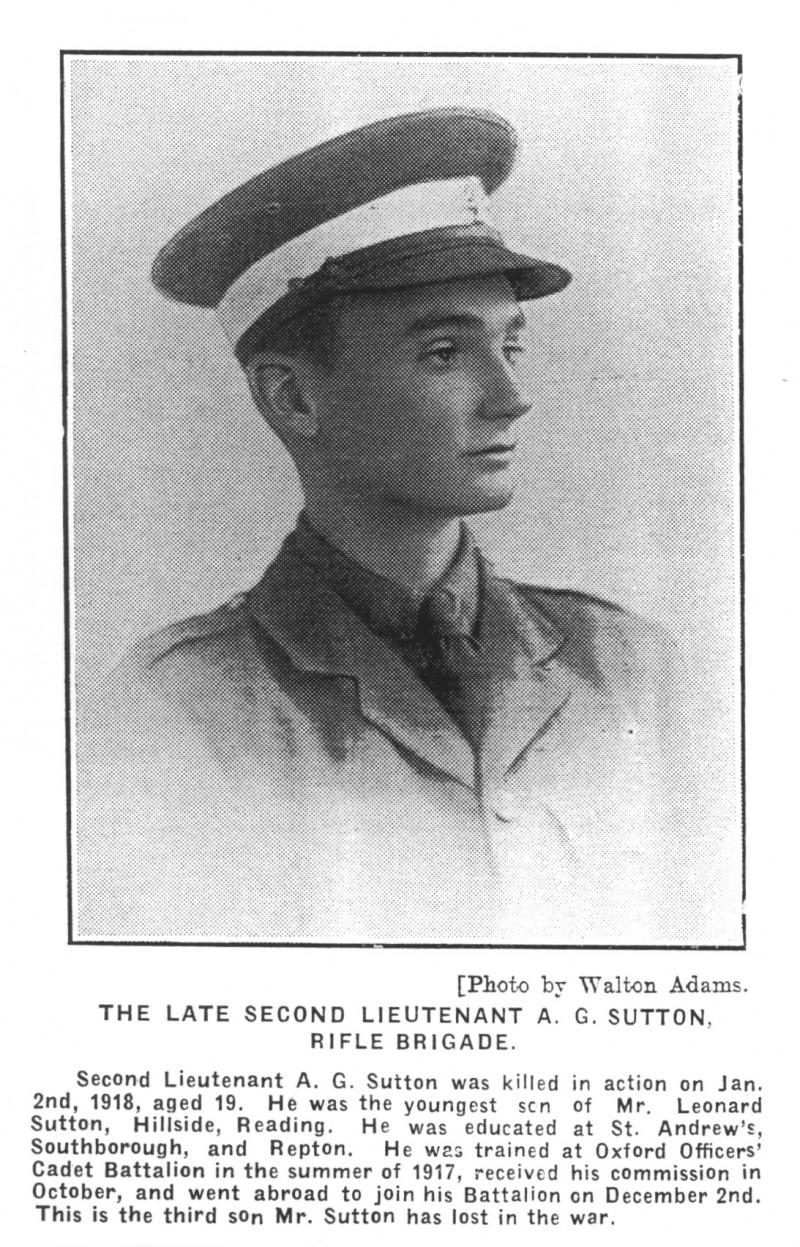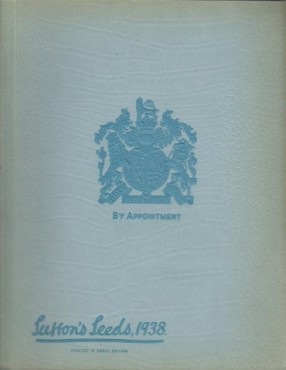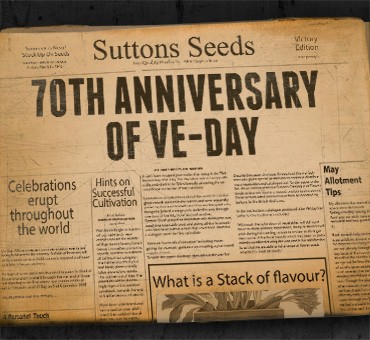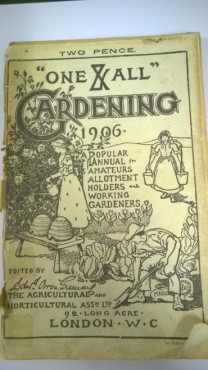At the outbreak of WW1 Leonard Goodhart Sutton was at the helm of Suttons & Sons and with 5 sons and 1 daughter he must have felt that his lineage was secure. Sadly this was not to be.
All five sons served in the army but tragically four died.
– Lieutenant Eric Sutton, 7th Battalion Royal Sussex Regiment was killed in 1916
– Lieutenant Victor Sutton, Royal Berkshire Yeomanry was killed in 1917
– Lieutenant Eustace Sutton, Royal Engineers was killed in 1918
– Lieutenant Alex (Alexander) Sutton, Rifle Brigade, was killed in 1918
Lieutenant Eric Sutton was awarded the Military Cross and came home to receive it at Buckingham Palace in February 1916. He was posthumously mentioned in despatched and would most likely have received another medal, had he survived.
“The next day (8th) passed quietly until 6.30pm when the Germans blew a large mine …. 17 miners were buried in the shaft and dugouts. All these miners were extricated except one man who went mad under the strain of his ordeal and shot himself. … Our casualties were heavy and included Lt E G Sutton who was shot by a sniper when climbing over … just after the explosion to find out what had happened. He was a very gallant young officer, the first in the Division it will be remembered to receive a decoration for bravery. In addition to his loss we had 8 other ranks killed and 39 wounded.”
The only surviving son was the eldest, Leonard Noel Sutton, known as Noel. Noel was a captain in the Berkshire Yeomanry but after the death of his four brothers he was brought home from Egypt, where his battalion was stationed. On the journey home, Noel’s ship, The Leasowe Castle, was torpedoed and sunk but Noel survived.
Noel joined the firm in 1920 and like his father carried out many civic duties. These included being High Sheriff of Berkshire, a Justice of the Peace, member of the Senate and Council of Reading University, governor of the Royal Berkshire Hospital and still more.
Further biographies:
Extracted from http://cemeteryjunctionwargraves.org.uk
Eric Sutton
Eric Guy Sutton was the grandson of Martin Hope Sutton, 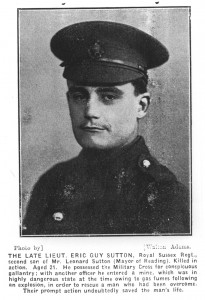 one of the founders of the Sutton Seeds business and the second son of Leonard Goodhart Sutton and his wife Mary Charlotte Sutton (nee Seaton). His mother probably died in childbirth in July 1900 giving birth to his only sister Emily May.
one of the founders of the Sutton Seeds business and the second son of Leonard Goodhart Sutton and his wife Mary Charlotte Sutton (nee Seaton). His mother probably died in childbirth in July 1900 giving birth to his only sister Emily May.
He was educated at Rugby where he was a keen rugby footballer. He had always expressed an ambition to enter the Army but after leaving school he decided on a business career. He spent a year in France and six months travelling in America preparing for this and was due to return to Reading in the autumn of 1914. On the outbreak of war he returned from California and was gazetted into his regiment in September 1914. In the spring of 1915 he went to the front and in June he was appointed lieutenant.
Eric Guy Sutton was awarded the Military Cross for “conspicuous gallantry on the night of September 12th 1915, near Armentieres. With another officer he entered a mine, which was in a highly dangerous state at the time owing to gas fumes following an explosion, in order to rescue a man who had been overcome. Their prompt action undoubtable saved the man’s life.” He was decorated a Buckingham Palace on 23 February 1916.
On hearing of the distinction awarded to him he wrote:
“On looking back upon the incident it seems a very paltry affair. It was over in a few moments. One of the things prominent in my mind is – How many thousands more, especially in Gallipoli, deserve the honour much more that I do!”
He was killed in action on 8 April 1916 aged 21 and is buried in Vermelles British Cemetery, Pas de Calais, grave location II. D. 20.
The circumstances of his death were reported as follows:
He was in charge of the Lewis (machine) guns, as he had been for some time,prior to which he had temporary command of his company. At 6.30 p.m. on 8th april 1916 the Germans exploded a mine under part of the British trenches blowing down the parapet and filling parts of the trench, leaving a portion exposed to rifle fire.
It appeard that in order to get his guns into position again he had to cross the exposed portion and examine the crater, and was shot by a sniper in the neck and died instantly.
Employees of the Sutton Seed firm were alerted to the sad news of his death by a flag flying at half mast over the business premises.
Victor Sutton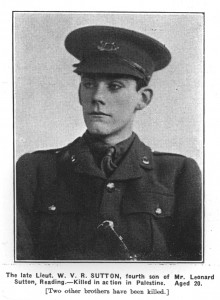
William Victor Ross Sutton was killed in action on 13 November 1917 aged 20.
He is buried in Ramleh War Cemetery, Israel, grave Q. 27.
William Victor Ross Sutton was the was the grandson of Martin Hope Sutton and third son of Leonard Goodhart Sutton. William was a border at St. Andrews, Southborough, Tunbridge Wells and later attended Repton School.
The Reading Standard 24 November 1917 published a obituary. On leaving school at the age of 17 years William spent a year in Canada working with his uncle farming in Saskatchewan, he was very keen on agriculture. He was also a keen sportsman. When he was nearly military age he returned to England to join the army. William was appointed to the Yeomanry commission in January 1916. William joined his battalion in Egypt in October 1916.
William was very enthusiastic about his military work and his commanding officer, writing soon after he joined, said “He was very keen and hard-working.”
William was promoted to a Lieutenant one month before he was killed. He was the second of the brothers to lose his life.
Alexander Sutton
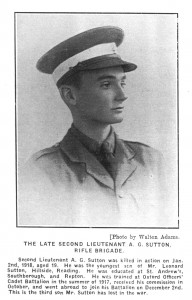
Alexander Gordon Sutton was killed in action on 2 January 1918 aged 19.
He is buried in Oxford Road Cemetery, Ypres. Grave location V. H. 9.
Alexander Gordon Sutton was the grandson of Martin Hope Sutton and the youngest son of Leonard Goodhart Sutton. The family home was ‘Hillside’ Allcroft Road, Reading. The 1911 census indicates that Alexander, aged 12 and his brother Noel and sister Emily were at the family home. The house was run by a team of ten servants.
Like his brother Eustace, Alexander was educated at St. Andrews, Southborough and Repton Schools. He was in training at Oxford with the Officers’ Cadet Battalion and received his commission in October 1917. He joined his battalion on 2 December 1917.
His obituary stated that he was a well known member of St. John’s Church, Reading which he attended with the other members of his family whilst in Reading. He was described as having a thoughtful and reverent demeanor. (St. John’s Church is now used by the Polish Roman Catholic community)
He was the third son of Leonard Goodhart Sutton to be killed in action.
Eustace Sutton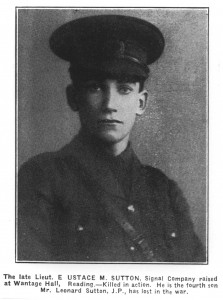
Eustace Martin Sutton was the second son of Leonard Goodhart Sutton and Mary Charlotte Sutton (nee Seaton). He was the fourth of the Sutton brothers to lose his life in the war.
Eustace was educated at St. Andrew’s School Southborough, Kent and Repton School. He had qualified to enter Balliol College in 1915. However, he was appointed from his Officer Training Corps to a commission in the Royal Engineers and he entered the Army before going to Oxford. He went abroad in January 1916. The 35th Signal Company was one of three Royal Engineers raised in Reading at the behest of his father.
The German Spring Offensive along the Western Front began on the 21 March 1918. In the early days of the attack the Germans made fast progress and great advances with the British taken by surprise. The fighting was fierce but the British found themselves in retreat and the bodies of the fallen easily lost as the Germans advanced. Eustace Martin Sutton was killed in action on 24 March 1918 aged 22. He has no known grave and his name is commemorated on the Poziers Memorial, Somme.
The local newspapers reported that Mr Sutton had received the following letter from the Brigadier-General of the brigade to which Eustace Martin Sutton was attached.
“My dear Mr Sutton,
I am writing to express to you my great sorrow at the loss of your son, E.M.Sutton, and to offer you my very sincere sympathy.
He was killed most gallantly leading a counter-attack, made up of signallers and other headquarters men, who were hastily collected and thrown in to stop a local rush of the enemy round brigade headquarters.
I last saw him full of keenness dashing forward cheering on his own signallers and the other details he had collected.
The enemy who killed him was bayonetted by one of his own signallers.
He is a very great loss. We were all very fond of him in our mess. He was a most reliable worker, and most gallant on all occasions and in several previous fights had done most valuable work. His cheerfulness and unfailing good temper were invaluable.
Please accept my very sincere sympathy for your loss.”
A sapper in Eustace’s signal company wrote:
“Poor Mr Sutton died a real hero,leading his section. We are all proud of him, and I sincerely hope his gallant action, which undoubtably saved a critical situation, will be duty recognised. Mr Tomson has taken Mr Eustace’s place. One of my operators, named Mr Davis, was killed.
The company has suffered very severely again, especially in officers. Mr Sutton’s place will be very hard to fill, and we all miss him terribly. It seems as though we had all lost a brother and a good friend. Personally, I suppose, owing to my many happy associations with him, I feel his loss more than anyone else. He always treated me so well, and I feel almost broken-hearted.
He died a hero’s death, shot by a sniper though the head, as he was leading part of his section into action at a very critical time during an attack, and it is the opinion of my men that his gallantry undoubtedly saved the situation.”
Noel Sutton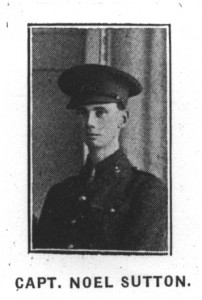
Leonard Noel Sutton was the grandson of Martin Hope Sutton and the eldest and only surviving son of Leonard Goodhart Sutton and his wife Mary Charlotte (nee Seaton). Born in 1894 he died in 1965 and is buried with his father and mother in the family grave.
Last Updated on November 30, 2022 by Suttons Horticultural Team

